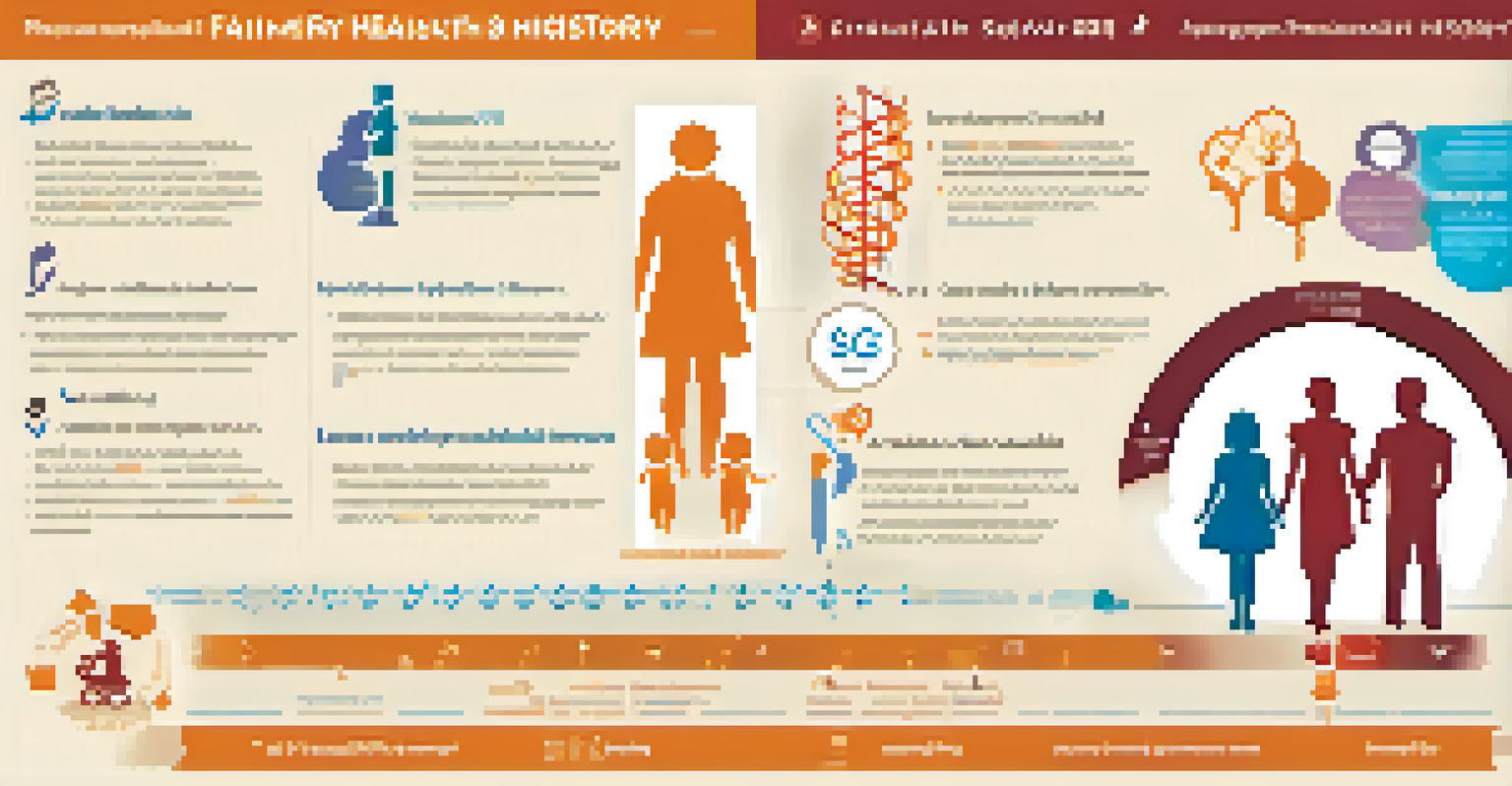How to Navigate Family Health History for Health Research

Understanding the Importance of Family Health History
Family health history is a treasure trove of information that can significantly impact health research. It encompasses the health conditions and diseases that family members have experienced, offering insights into genetic predispositions. Understanding this history allows researchers to identify patterns and risk factors that may affect not just individuals but entire families.
Family history is a powerful tool in predicting disease risk and guiding preventive care.
When you gather information about your family's health, you create a roadmap for potential health challenges you might face. For instance, if multiple relatives have had heart disease, this could indicate a hereditary risk that warrants closer monitoring. Thus, collecting this information is not just about looking back; it’s about preparing for the future.
Moreover, family health history serves as a powerful tool for researchers. It helps them understand how certain diseases may cluster in families, leading to better prevention and treatment strategies. Essentially, your family's health story could contribute to broader health solutions.
How to Collect Family Health History Effectively
Collecting family health history might seem daunting, but it can be broken down into manageable steps. Start by creating a simple family tree, noting down the health conditions of immediate and extended family members. This visual representation can help you see patterns more clearly, making your research more effective.

Don’t hesitate to reach out to family members for their input. Conversations can uncover valuable information that may not be documented anywhere else. For example, an aunt might recall a rare condition that affected a grandparent, which could be crucial for your research.
Family Health History's Significance
Understanding your family's health history can reveal genetic risks and help shape preventive health strategies.
Additionally, consider using tools or templates specifically designed for collecting family health history. These can guide you in gathering information systematically, ensuring you don’t miss important details. A comprehensive approach will enhance the quality of your health research.
Identifying Key Health Conditions to Look For
When navigating family health history, it's essential to focus on specific health conditions that have known genetic links. Common examples include heart disease, diabetes, and certain cancers. By pinpointing these conditions, you can better assess your own risk factors and take proactive measures.
Knowing your family health history can help you take charge of your health and make informed decisions.
Pay attention to the age at which family members were diagnosed with these conditions. Early onset can be a significant indicator of genetic predisposition. For instance, if a parent had diabetes in their 30s, it may suggest a higher likelihood of developing the condition yourself, prompting earlier lifestyle changes or medical check-ups.
Lastly, don’t overlook mental health conditions, as these can also run in families. Conditions like depression or anxiety may not always be discussed openly, but understanding their prevalence in your family can lead to better management strategies. This holistic view of health conditions will enrich your research.
The Role of Genetic Testing in Family Health Research
Genetic testing can be a game-changer in understanding family health history. It provides concrete data that can either confirm or refute family health trends you've observed. For example, if there’s a history of breast cancer, genetic testing can reveal if you carry BRCA gene mutations that increase your risk.
However, it’s important to approach genetic testing with caution. Consult with healthcare professionals to understand the implications of the results and how they fit into your family health narrative. This guidance helps in making informed decisions about your health and potential preventive measures.
Effective Collection Methods
Creating a family tree and engaging relatives can simplify the process of gathering crucial health information.
Moreover, genetic testing can also aid in research efforts. The results can contribute to larger studies, helping scientists understand genetic links to diseases better. By participating in this way, you’re not just benefiting your own health but also contributing to the greater good.
Utilizing Family Health History in Preventive Care
Once you've gathered family health history, it's crucial to leverage this information for preventive care. Share your findings with your healthcare provider, who can tailor screening and preventive measures to your specific risk factors. This proactive approach can lead to early detection of potential health issues.
For example, if your family has a history of colon cancer, your doctor might recommend earlier and more frequent screenings than the general population. This personalized care plan can significantly improve health outcomes over time.
Additionally, understanding your family health history can motivate lifestyle changes that reduce risk. Whether it’s adopting a healthier diet, increasing physical activity, or managing stress, these small adjustments can make a big difference in your long-term health.
Engaging Family Members in the Process
Engaging your family in the process of collecting health history can be both informative and bonding. Organizing family gatherings to discuss health questions can open up conversations that might not happen otherwise. Sharing stories about health experiences can lead to a better understanding of everyone's health journey.
Encouraging open dialogue about health can also demystify certain conditions and reduce stigma. For instance, discussing mental health openly can foster a supportive environment where family members feel comfortable seeking help.
Genetic Testing's Impact
Genetic testing provides valuable insights that can confirm familial health trends and guide personal health decisions.
Additionally, consider involving younger family members in these discussions. Teaching them about the importance of family health history can empower them to take charge of their health in the future. This collective effort can strengthen family ties while enhancing health awareness.
The Future of Family Health History in Research
The future of family health history in health research looks promising, especially with advancements in technology. Online platforms and apps are now available to simplify the collection and analysis of family health data. These tools can help researchers and individuals track health trends over generations more effectively.
Moreover, as more people engage in health research, the collective knowledge base will grow. This influx of information can lead to groundbreaking discoveries about genetic links to diseases, ultimately improving public health strategies. Your family’s health history could play a crucial role in shaping these future developments.

In essence, family health history is not just a collection of facts; it's a narrative that can drive health research forward. By contributing your story, you’re participating in a larger conversation about health that could benefit countless others in the future.